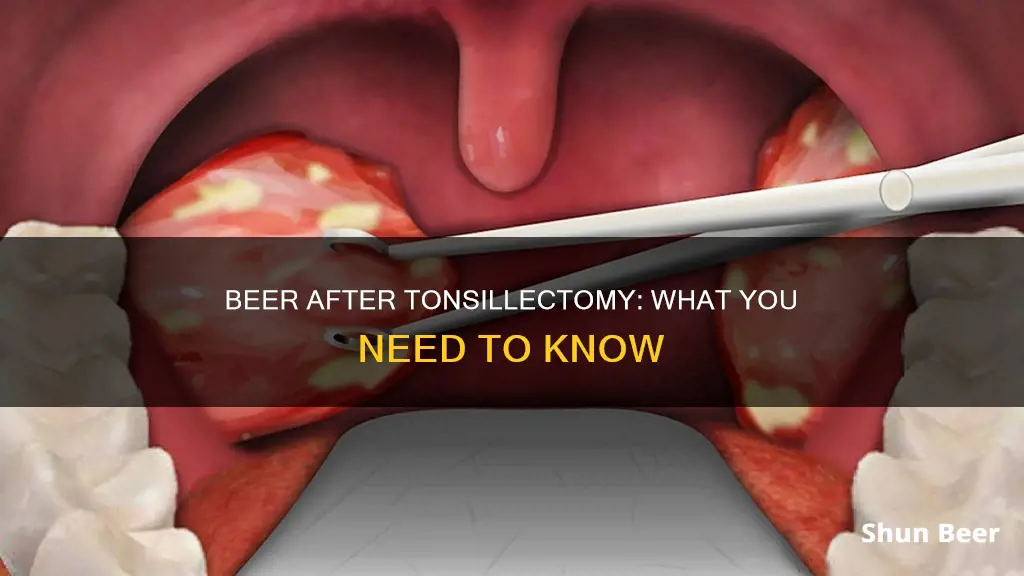
Drinking alcohol after a tonsillectomy is not recommended by doctors, as it can cause irritation to the throat and slow down the healing process. Alcoholic beverages, including wine and beer, should be avoided during the postoperative period as they can negatively affect the healing process. It is best to wait at least two weeks before consuming alcohol, and even then, it is important to drink responsibly and avoid drinks that are high in alcohol content or carbonation.
What You'll Learn

Healing time after tonsillectomy
Tonsillectomy is the surgical removal of the tonsils, the round, fleshy masses in the back of your throat. The procedure is recommended by healthcare providers to treat breathing-related sleep disorders, such as sleep apnea, or to reduce the risk of infection in people with frequent or chronic tonsillitis. While tonsillectomies are less common than they used to be, they are still performed on over 500,000 people every year in the US.
The recovery time for a tonsillectomy is typically around two weeks, but this can vary depending on several factors, including the patient's age, overall health, and ability to follow post-operative instructions. Small children tend to recover the fastest, sometimes feeling better just a few days after surgery. Older children, teens, and adults may take longer, with teens and adults requiring about two weeks to bounce back.
It is important to get lots of rest, drink fluids, and eat soft or cold foods during the recovery period, especially in the first two to three days after surgery. Drinking alcohol is not recommended during the post-operative period as it can negatively affect the healing process. Patients should abstain from alcoholic beverages for at least two to three weeks or for as long as possible.
The surgical wound from a tonsillectomy takes about 2-3 weeks to heal completely, depending on the patient's physical condition, diet, and care. A diverse and balanced diet can promote quick wound healing, reduce the risk of bleeding, and fight infection. However, it is important to choose the right types of food and drink, as the surgical wound is located directly in the eating and drinking path. Doctors recommend eating soft, liquid, and cold foods and avoiding spicy, strong spices, hot, and hard foods, as these can easily damage the surgical area.
Beer Overdose: The Unfortunate Link to Erectile Dysfunction
You may want to see also

Alcohol and the risk of bleeding
Alcohol consumption after a tonsillectomy is not recommended, as it can cause irritation to the throat and slow down the healing process. Alcohol can also increase the risk of bleeding, which is a potential complication of the procedure.
The recovery time after a tonsillectomy can vary, but most people can return to their normal activities within a few weeks. It is generally recommended to wait at least one to two weeks before consuming alcohol, to ensure that the surgical site is healed and there is no risk of further irritation or infection.
Alcohol can interfere with the healing process and cause excessive bleeding. This is because alcohol changes the permeability of the mucosa, destroys the surface lipid layer that protects the mucosa, and negatively affects the healing process. It is important to note that the healing process may take longer for some people, and if you are still experiencing pain or discomfort after two weeks, you should continue to abstain from drinking alcohol.
In addition, it is important to avoid any beverages that may irritate the throat, such as carbonated drinks, while healing. Alcoholic beverages, including wine and beer, should be avoided during the postoperative period. If you experience any pain or discomfort after drinking alcohol, you should seek medical attention immediately. It is also important to be aware of any signs of infection, such as fever, difficulty swallowing, and swelling.
Overall, it is best to abstain from alcohol for at least two weeks after a tonsillectomy, or for as long as possible, to ensure a safe and healthy recovery.
Coffee Conundrum: Pee Smells Like Beer, Why?
You may want to see also

Throat irritation
To avoid throat irritation after a tonsillectomy, it is important to follow a soft, liquid, and cold food diet. Porridge, milk, yoghurt, minced meat, vegetables, and soft fruits are ideal. It is also important to avoid spicy, strong spices, and hot foods, as these can easily damage the tonsil surgery pit area. In addition, it is recommended to avoid speaking loudly, talking too much, or exercising strenuously, as these activities can also irritate the throat.
If you are experiencing throat irritation after drinking beer or other alcoholic beverages, it is important to seek medical attention immediately. Throat irritation can be a sign of infection, and other symptoms to look out for include fever and difficulty swallowing. Returning to drinking alcohol after a tonsillectomy should be done gradually and responsibly, with moderation being key. Drinking on an empty stomach should be avoided, and staying hydrated with water is important.
Drinking Beer While Taking Allegra: What You Need to Know
You may want to see also

Drinking alcohol with medication
Drinking alcohol after a tonsillectomy is not recommended, especially when taking medication. Alcohol can interfere with the healing process and may cause excessive bleeding. It is best to wait at least one to two weeks after the surgery before consuming any alcoholic beverages, and this is to ensure that the surgical site is healed and that there is no risk of further irritation or infection.
The tonsils are located deep in the mouth and throat, so the process of caring for the surgical site is different from that of skin wounds. The time needed for the tonsil surgery site to heal completely is about 2-3 weeks, depending on the patient's physical condition, diet, and care. A diverse, balanced diet promotes quick wound healing, reduces the risk of bleeding, and fights infection. Doctors recommend patients eat soft, liquid, and cold foods and avoid spicy, strong spices, hot, and hard foods, which can easily damage the surgery site.
Combining alcohol with medication can also be dangerous. Firstly, it is advised not to drink when taking antibiotics or painkillers (except for plain paracetamol). Alcohol should never be mixed with medications containing codeine or oxycodone. Secondly, alcohol changes the permeability of the mucosa, destroys the surface lipid layer that protects the mucosa, and negatively affects the healing process after a tonsillectomy.
Therefore, it is best to avoid alcohol for at least the duration of the post-operative period (about 2-3 weeks) or as long as possible. If you are unsure about when it is safe to drink alcohol after a tonsillectomy, it is always best to consult your doctor for advice.
Sinusitis Sufferer's Guide: Beer Drinking Days Are Over
You may want to see also

How to drink safely after a tonsillectomy
Drinking alcohol after a tonsillectomy can cause several issues, including irritation to the throat, slowed healing, and excessive bleeding. It is therefore recommended to wait at least one week, and preferably two weeks, before consuming any alcohol. Even then, it is best to drink in moderation and avoid drinks with a high alcohol or carbonation content.
- Wait at least one week: It is important to give your body time to heal before introducing alcohol. Waiting at least a week will help reduce the risk of excessive bleeding and give your throat time to recover.
- Get the all-clear from your doctor: Before consuming any alcohol, check with your doctor to ensure that it is safe to do so. They will be able to evaluate your incision and advise you on whether it is safe to start drinking again.
- Drink in moderation: When you do start drinking again, it is important to drink responsibly and in moderation. Excessive alcohol consumption can delay healing and cause other health issues.
- Avoid high-alcohol and carbonated drinks: Drinks with a high alcohol content or high levels of carbonation can be harsh on the throat and cause further irritation. Stick to drinks that are low in alcohol and carbonation, and avoid shots or strong cocktails.
- Drink with food: Drinking alcohol on an empty stomach can increase the risk of irritation. Eat a meal before or after drinking to help reduce this risk.
- Stay hydrated: Drinking plenty of water throughout the day will help keep your throat moist and reduce the risk of irritation.
- Be aware of infection signs: If you experience any pain, difficulty swallowing, fever, or swelling after drinking, seek medical attention immediately. These could be signs of infection, and it is important to get treated as soon as possible.
- Follow your doctor's instructions: Throughout your recovery, it is important to follow your doctor's instructions and take any prescribed medications. This will help ensure a safe and healthy recovery.
Beer and Chemo: What's Safe to Drink?
You may want to see also
Frequently asked questions
It is recommended to wait at least one week after a tonsillectomy before consuming any alcohol. This is to ensure that the area is healed and that there is no risk of further irritation or infection. It is also important to avoid drinking while taking antibiotics or painkillers.
Alcohol may interfere with the healing process and can cause excessive bleeding. It can also irritate the throat and slow down healing.
Drinking alcohol after a tonsillectomy can cause irritation to the throat and may lead to further infection. It can also cause dehydration and delay healing.
It is important to focus on a diverse and balanced diet that promotes healing and reduces the risk of bleeding and infection. Doctors recommend soft, liquid, and cold foods such as porridge, milk, yogurt, and vegetables.







